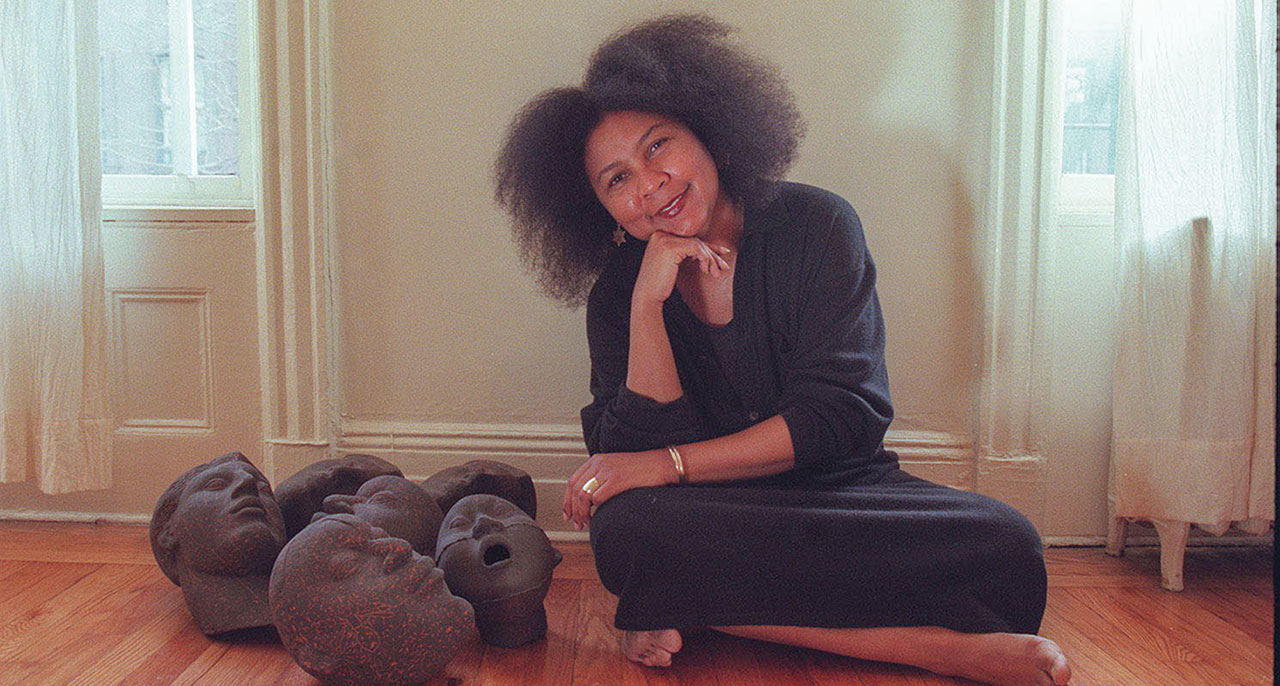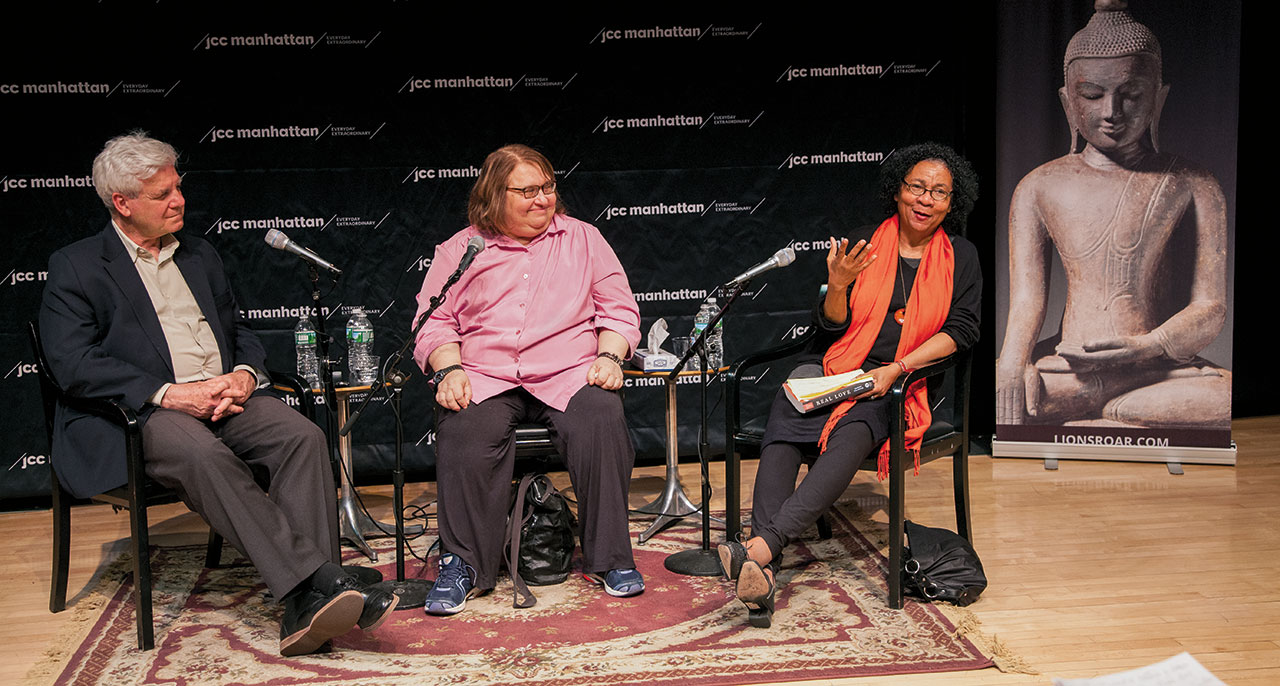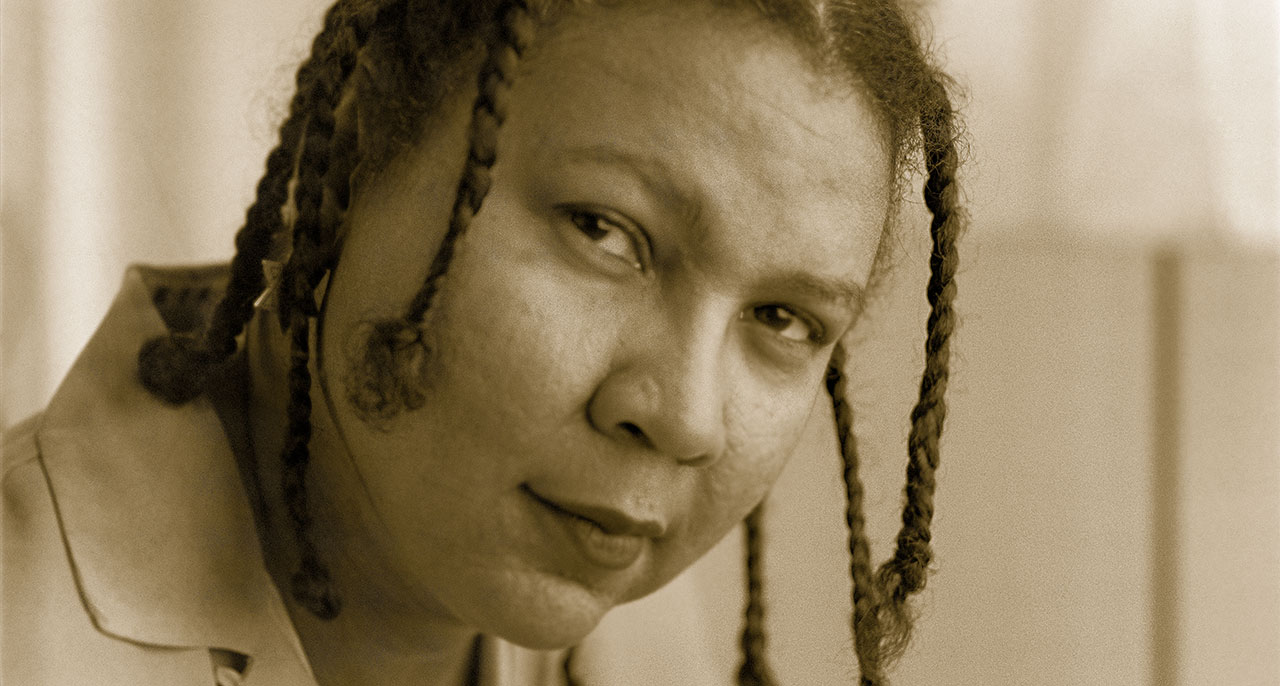Fundamentally, the practice of love begins with acceptance—the recognition that wherever we are is the appropriate place to practice, that the present moment is the appropriate time. But for so many of us, our longing to love and be loved has always been about a time to come, a space in the future when it will just happen, when our hungry hearts will finally be fed, when we will find love.
More than thirty years ago, when I first began to think about Buddhism, there was little or no talk about Buddhism and love. Being a Buddhist was akin to being a leftist: it was all about the intellect, the philosophical mind. It was a faith for the thinking “man,” and love was nowhere to be found in the popular Buddhist literature at that time. In circles where an individual would dare to speak of love, they would be told that Buddhists were more concerned with the issue of compassion. It was as though love was just not a relevant, serious subject for Buddhists.
During the turbulent sixties and seventies the topic of love had made its way to the political forefront. Peace activists were telling us to “make love not war.” And the great preacher Martin Luther King, Jr., elevated the call to love from the hidden longing of the solitary heart to a public cry. He proclaimed love to be the only effective way to end injustice and bring peace, declaring that “Sooner or later all the people of the world will have to discover a way to live together in peace.… If this is to be achieved, man must evolve for all human conflict a method which rejects revenge, aggression, and retaliation. The foundation of such a method is love.”
There could not have been a more perfect historical dharma moment for spiritual leaders to speak out on the issue of love. No doubt divine providence was at work in the universe when Martin Luther King, Jr., and a little-known Vietnamese Buddhist monk named Thich Nhat Hanh, found themselves walking the same path—walking toward one another—engaged in a practice of love. Young men whose hearts were awakening, they created in mystical moments of sacred encounter a symbolic sangha.
They affirmed one another’s work. In the loneliness of the midnight hour, King would fall on his knees and ask himself the question, “How can I say I worship a God of love and support war?” Thich Nhat Hanh, knowing by heart all the bonds of human connection that war severs, challenged the world to think peace, declaring in the wake of the Vietnam War that he “thought it was quite plain that if you have to choose between Buddhism and peace, then you must choose peace.” Linking Buddhism with social engagement, Thich Nhat Hanh’s work attracted Westerners (myself included) precisely because he offered a spiritual vision of the universe that promoted working for peace and justice.

Significantly, Buddhism began to attract many more Western followers because it linked the struggle for world peace with the desire of each individual to be engaged in meaningful spiritual practice. Coming out of a time when it had been cool for smart people to be agnostic or atheist, people wanted permission to seek spiritual connection.
For many Western seekers, the feeling that we had failed to create a culture of peace and justice led us back to an introspective search of our intimate relations, which more often than not were messy and full of strife, suffering, and pain. How could any of us truly believe that we could create world peace when we could not make peace in our intimate relationships with family, partners, friends, and neighbors?
Responding to this collective anguish of spirit, visionary teachers (like King, Thich Nhat Hanh, the Dalai Lama, Sharon Salzberg) were moved by spiritual necessity to speak more directly about the practice of love. Proclaiming transformation in his consciousness engendered by a focus on love, Thich Nhat Hanh declared in the poem “The Fruit of Awareness Is Ripe”: when I knew how to love the doors of my heart opened wide before the wind. / Reality was calling out for revolution. That spirit of revolution, that call to practice transformative love, captured my critical imagination and merged with my longing to find a loving partner.
When lecturing on ending domination around the world, listening to the despair and hopelessness, I asked individuals who were hopeful to talk about what force in their life pushed them to make a profound transformation, moving them from a will to dominate toward a will to be compassionate. The stories I heard were all about love.
That sense of love as a transformative power was also present in the narratives of individuals working to create loving personal relationships. Writing about metta, “love” or “loving-kindness,” as the first of the brahmaviharas, the heavenly abodes, Sharon Salzberg reminds us in her insightful book Lovingkindness: The Revolutionary Art of Happiness that “In cultivating love, we remember one of the most powerful truths the Buddha taught…that the forces in the mind that bring suffering are able to temporarily hold down the positive forces such as love or wisdom, but they can never destroy them.… Love can uproot fear or anger or guilt, because it is a greater power. Love can go anywhere. Nothing can obstruct it.”
Because of the awareness that love and domination cannot coexist, there is a collective call for everyone to place learning how to love on their emotional and/or spiritual agenda. We have witnessed the way in which movements for justice that denounce dominator culture, yet have an underlying commitment to corrupt uses of power, do not really create fundamental changes in our societal structure. When radical activists have not made a core break with dominator thinking (imperialist, white supremacist, capitalist patriarchy), there is no union of theory and practice, and real change is not sustained. That’s why cultivating the mind of love is so crucial. When love is the ground of our being, a love ethic shapes our participation in politics.
To work for peace and justice we begin with the individual practice of love, because it is there that we can experience firsthand love’s transformative power. Attending to the damaging impact of abuse in many of our childhoods helps us cultivate the mind of love. Abuse is always about lovelessness, and if we grow into our adult years without knowing how to love, how then can we create social movements that will end domination, exploitation, and oppression? John Welwood shares the insight in Perfect Love, Imperfect Relationships that many of us carry a “wound of the heart” that emerged in childhood conditioning, creating “a disconnection from the loving openness that is our nature.” Welwood links individual failure to learn how to love in childhood with larger social ills; however, even those who are fortunate to love and be loved in childhood grow to maturity in a culture of domination that devalues love.

Being loving can actually lead one to be more at odds with mainstream culture. Even though, as Riane Eisler explains in The Power of Partnership, our “first lessons about human relations are not learned in workplaces, businesses, or even schools, but in parent–child and other relations,” those habits of being are not formed in isolation. The larger culture in our nation shapes how we relate. Any child born in a hospital first experiences life in a place where private and public merge. The interplay of these two realities will be constant in our lives. It is precisely because the dictates of dominator culture structure our lives that it is so difficult for love to prevail.
When I began, years ago now, to focus on the power of love as a healing force, no one really disagreed with me. Yet what they continue to accept in their daily life is lovelessness, because doing the work of love requires resisting the status quo. In Thich Nhat Hanh’s treatise on the subject, True Love: A Practice for Awakening the Heart, he reminds us that “to love, in the context of Buddhism, is above all to be there.” He then raises the question of whether or not we have time for love. Right now there is such a profound collective cultural awareness that we need to practice love if we are to heal ourselves and the planet. The task awaiting us is to move from awareness to action. The practice of love requires that we make time, that we embrace change.
Fundamentally, to begin the practice of love we must slow down and be still enough to bear witness in the present moment. If we accept that love is a combination of care, commitment, knowledge, responsibility, respect, and trust, we can then be guided by this understanding. We can use these skillful means as a map in our daily life to determine right action. When we cultivate the mind of love, we are, as Sharon Salzberg says, “cultivating the good,” and that means “recovering the incandescent power of love that is present as a potential in all of us” and using “the tools of spiritual practice to sustain our real, moment-to-moment experience of that vision.” To be transformed by the practice of love is to be born again, to experience spiritual renewal. What I witness daily is the longing for that renewal and the fear that our lives will be changed utterly if we choose love. That fear paralyzes. It leaves us stuck in the place of suffering.
When we commit to love in our daily life, habits are shattered. We are necessarily working to end domination. Because we no longer are playing by the safe rules of the status quo, rules that if we obey guarantee us a specific outcome, love moves us to a new ground of being. This movement is what most people fear. If we are to galvanize the collective longing for spiritual well-being that is found in the practice of love, we must be more willing to identify the forms that longing will take in daily life. Folks need to know the ways we change and are changed when we love. It is only by bearing concrete witness to love’s transformative power in our daily lives that we can assure those who are fearful that commitment to love will be redemptive, a way to experience salvation.
Lots of people listen to and affirm the words of visionary teachers who speak on the necessity of love. Yet they feel in their everyday lives that they simply do not know how to link theory and practice. When Thich Nhat Hanh tells us in Transformation and Healing that “understanding is the very foundation of love and compassion,” that “if love and compassion are in our hearts, every thought, word, and deed can bring about a miracle,” we are moved. We may even feel a powerful surge of awareness and possibility.
Then we go home and find ourselves uncertain about how to realize true love. Finding ways to express true love requires vigilance, patience, a will to let go, and the creative use of the imagination to invent new ways of relating. Thich Nhat Hanh told me to see the practice of love in a tumultuous relationship as spiritual practice, to find in the mind of love a way to understanding, forgiveness, and peace. Of course this was all work. Just as cultivating a garden requires turning over the ground, pulling weeds, planting, and watering, doing the work of love is all about taking action.
Whenever anyone asks me how they can begin the practice of love, I tell them giving is the place to start. In The Return of the Prodigal Son, Henri Nouwen offers this testimony: “Every time I take a step in the direction of generosity I know that I am moving from fear to love.” Salzberg sees giving as a way to purify the mind: “Giving is an inward state, a generosity of the spirit that extends to ourselves as well as to others.” Through giving we develop the mind of gratitude. Giving enables us to experience the fullness of abundance—not only the abundance we have, but the abundance in sharing. In sharing all that we have we become more. We awaken the heart of love.
Dominator thinking and practice relies for its maintenance on the constant production of a feeling of lack, of the need to grasp. Giving love offers us a way to end this suffering—loving ourselves, extending that love to everything beyond the self, we experience wholeness. We are healed. The Buddha taught that we can create a love so strong that, as Salzberg states, our “minds become like a pure, flowing river that cannot be burned.” Such love is the foundation of spiritual awakening.
If we are to create a worldwide culture of love then we need enlightened teachers to guide us. We need concrete strategies for practicing love in the midst of domination. Imagine all that would change for the better if every community in our nation had a center (a sangha) that would focus on the practice of love, of loving-kindness.
All the great religious traditions share the belief that love is our reason for being. All of us who work toward creating a culture of love seek to share a real body of teaching that can reach everyone where we are, extending the circle of love beyond boundaries, bringing together people from different backgrounds and traditions, and feeling together the way love connects us.
